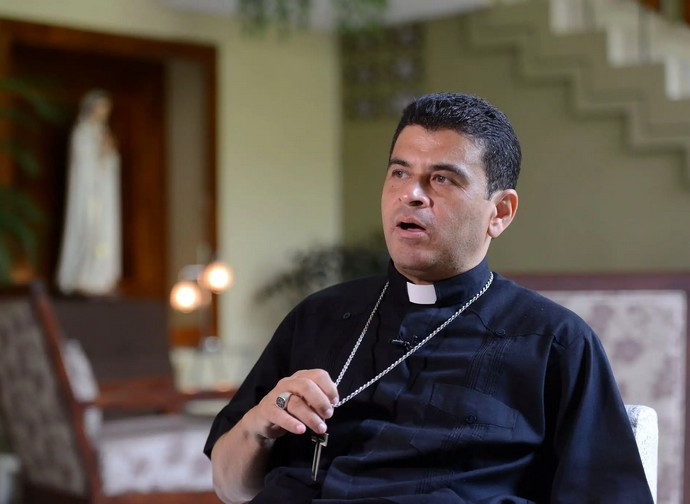Nicaragua, bishop Álvarez’s slow martyrdom in Ortega’s prison
The decision not to abandon his people and not to kowtow to the dictator Ortega, has cost the bishop of Matagalpa a long prison sentence in the most inhumane conditions in a maximum security prison. But, there is international silence on his imprisonment during the last four months.

Monsignor Rolando Álvarez, bishop of Matagalpa, is a courageous Pastor who chose not abandon his flock and leave his homeland despite grave consequences. He could have easily complied with the order to take exile in the United States imposed on him by the totalitarian regime of Daniel Ortega, but instead decided to serve the absurd prison sentence of twenty-six years and four months imposed on him by judge Nadia Tardencilla Rodríguez, of the second district court of Managua, in his own country. The guilty verdict, which came at the conclusion of a show trial, counted multiple convictions of conspiracy, dissemination of false news, and a series of typical crimes normally used by totalitarian regimes to eliminate opponents. In reality, Msgr. Álvarez’s only fault was to address the understandable criticisms of a regime known for its policy of aggression and physical intimidation against the Catholic Church.
Thus, the dissident bishop, since February 9, 2023, has been serving his sentence in the Jorge Navarro National Penitentiary Institute better known as "The model". He is currently held in solitary confinement in one of the maximum security cells in Gallery 300, consisting of about 150 real "niches" distributed in three modules. Mons. Álvarez is located in module 3-1, which is an isolated one-storey underground building known as "Infernetto", due to the absolute lack of hygiene and above all the torrid heat which recalls the scorching flames of the underworld.
In those maximum security cells, inaugurated by the regime in 2015, the detainees find themselves exposed to humidity, cold and temperatures that reach 45° centigrade, forcing the unfortunate inmates, such as Msgr. Álvarez, to remain in his underwear all day, given that even the light blue prison uniform is intolerable. In that oven, the only concession made by the jailers is a bottle of water a day to drink. Those who have survived that Dantesque nightmare, recount the indescribable claustrophobic breaking sensation of anguish, and the desperate desire to escape.
The cells measure two by two and a half meters and are made of concrete, the same material with which everything is made, including the cots. In this narrow space a tiny bathroom is squeezed consisting of a dilapidated sink pipe, from which cockroaches, cockroaches and other insects scurry, and a metal toilet without a drain that is perpetually dirty as the jailers deny the use of a bucket or container for the water needed to drain the faeces. Even the little foul-smelling air that circulates inside the cell contributes to the definition of "little hell" given to that penitentiary pavilion. The only source of air and light is a small window in the door which measures about 25cm high by 12cm wide, sealed by a wire mesh, and another small opening 15cm wide by 15cm high through which food is passed to the inmates. The menu is always the same: rice and beans three times a day, even if it is usually served only once. More often than not worms are found in the rice. While, inside the cell there is no electricity and no artificial light, not even a light bulb for the night.
The prisoners kept in these infernal hot conditions cannot even make use of the toilet water to refresh themselves, since the water service is active only for twenty minutes twice a day, at five in the morning and at noon. The regime, however, not satisfied with keeping human beings in such deplorable conditions, claims to monitor its detainees 24 hours a day through a system of cameras installed in each cell.
This kind of detention, which involves absolute isolation, would severely test the psychological metal of any human being. For the past five months Monsignor Rolando Álvarez has spent every day in absolute solitude, not counting the company of cockroaches and the surveillance camera pointed at him day and night. In such deplorable conditions, it is only possible to survive and avoid becoming insane by the strength of faith and prayer. In fact, the Bishop of Matagalpa is a martyr of our day. And a great example for many of his confreres who, in his place, would certainly not have hesitated to take the plane to Miami and flee to comfortable exile in the United States.
Even the Catholic Church in Italy, in addition to organising questionable prayer vigils against so-called "homophobia", would do well to remember the many pastors scattered around the world are living martyrs. It would certainly be more immediate for the faithful to understand the need for a prayer vigil for poor Monsignor Rolando Àlvaro, an innocent victim of one of the most ruthless totalitarian regimes in the world today.
Perhaps, even many democrats and liberals should be less distracted with regards to the denunciation of communist regimes which, in 2023, force their opponents to live in conditions that recall the scenes from the famous film Papillon by Franklin Schaffner set in the penitentiary on Devil's Island, the worst prison colony in French Guiana.
